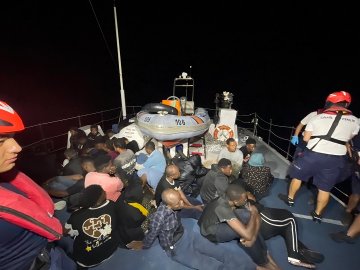Rescue Operations for Migrants Surge Between Greece and Turkey
In recent days, the humanitarian crisis in the Mediterranean has escalated, with hundreds of migrants rescued and apprehended in various operations between Greece and Turkey. This surge highlights the ongoing challenges faced by migrants attempting to cross the perilous waters in search of safety and a better life.
The Current Situation
As countries in Europe grapple with the influx of migrants, the situation in the Aegean Sea remains critical. Over the past few days, numerous rescue missions have taken place, with authorities in both Greece and Turkey collaborating to assist those in distress. The operations illustrate both the resilience of those seeking asylum and the ongoing demand for effective immigration policies.
Migrants often embark on dangerous journeys, risking their lives to escape conflict, persecution, and dire economic circumstances in their home countries. The recent events have sparked discussions about the need for comprehensive immigration reform that addresses the root causes of migration while ensuring the safety of those involved.
Factors Contributing to the Crisis
Several factors contribute to the ongoing migration crisis:
The intersection of these elements creates a complex landscape for migrants. Many hope to reach safer shores where they can rebuild their lives, but the journey often comes with significant hardships.
The Role of Rescue Operations
Organizations and governments are stepping up their efforts to conduct rescue operations in the Mediterranean. These missions aim to save lives and provide immediate assistance to those in distress. However, they also highlight the ongoing need for a more coordinated response to the challenges posed by migration.
The recent surge in rescue operations serves as a reminder of the humanitarian obligations that nations have towards migrants. It underlines the importance of establishing safe and legal pathways for migration, reducing the reliance on perilous sea routes.
Immigration Policy Considerations
In light of the recent surge in migrant rescues, policymakers are called to consider various aspects of immigration policy. The discussion surrounding immigration reform is crucial in creating a system that not only protects the rights of migrants but also ensures national security and order.
Key considerations include:
As nations navigate these complex issues, it is imperative to foster a more compassionate approach towards migration, recognizing the humanity of those seeking refuge.
Conclusion
The recent rescue operations between Greece and Turkey signify a critical moment in the ongoing migration crisis in Europe. As the situation continues to evolve, it is essential for governments and organizations to work together to address the challenges and provide safe alternatives for those in need.
While the plight of migrants is often portrayed in stark terms, it is crucial to remember the human stories behind the statistics. Comprehensive immigration reform that prioritizes safety, dignity, and human rights is necessary as nations respond to the urgent needs of migrants on the move.
The ongoing events serve as a call to action for both policymakers and society as a whole to engage in meaningful dialogue, aiming for solutions that balance humanitarian needs with national interests. As we look toward the future, the hope remains that safer and more dignified pathways for migration can be established, ultimately leading to a more just and equitable world.










